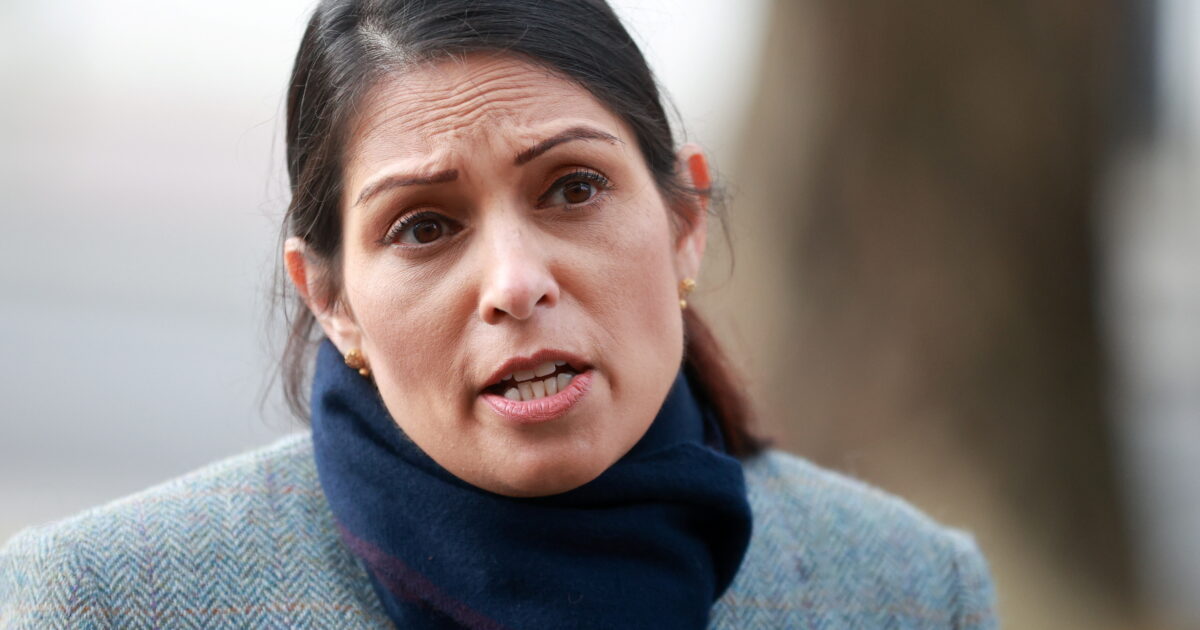The use of anti-terror laws against pro-Palestine activists can be traced back to a meeting between former Tory home secretary Priti Patel and Israeli arms firm Elbit, recently released documents reveal. The documents also show that Patel involved an anti-terror official who previously worked for the arms lobby in the discussions.
Since 2020, activists from Palestine Action have been breaking into the UK based factories of Elbit, spraying red paint and causing serious damage. In recent months, the authorities have controversially stepped up their actions against the group, using counter-terror laws against activists.
There is ample evidence to show that ministers have tried to influence the police over the protests. In September, briefing notes revealed that Patel met Martin Fausset, UK CEO of Israel arms firm Elbit in March 2022, in order to “reassure” him about the protests.
Now, records of the meeting, released to Palestine Action under Freedom of Information in December 2024 after a six-month delay, can shine more light on the matter. In particular, the records show that following this meeting, it was Patel who got anti-terror officials involved.
Deep concern.
By March 2022 when Patel and Fausset met, Palestine Action had repeatedly targeted Elbit with its actions, blockading factories and office buildings across the country.
Records of the meeting show Fausset told Patel, “the protesters were well organised, funded and trained” and “damage” to factories was “severe”.
Patel made sure to “reassure” Fausset that she took “the criminal protest acts” against his firm “seriously”. She said she was “deeply concerned about everything she heard”.
Notes from Patel’s meeting were sent to officials to “outline immediate next steps as a priority”. These “next steps” included five lines of suggestions from Patel herself.

We do not know what the suggestions were, as they were redacted in released documents. But we do know which officials were sent these “next steps”. The first two are directors of home office anti-terrorism strategies.
One was Michael Stewart, director of Prevent – the home office scheme to divert people away from terrorism. The second official sent the email was Shaun Hipgrave, director Protect and Prepare – two more strands of the government’s anti-terror strategy.
Involving counter-terror officials in defending Elbit was a big stretch: home office briefing documents for their meetings with Elbit admit Palestine Action “engage in civil disobedience and direct action” and “does not meet the threshold for proscription as they do not commit” or “encourage … acts of terrorism”. Patel appears to have ignored this advice.
However, Hipgrave may have been particularly receptive to using anti-terrorism powers to defend Elbit because, for six years up to 2017, Hipgrave was a vice president of ADS (Aerospace Defence Security), the UK’s weapons industry lobbying group of which Elbit is a member.
Emily Apple, media coordinator for the Campaign Against Arms Trade (CAAT) , told Novara Media: “ADS is nothing more than a lobbying group for the arms trade and it is outrageous that its former vice-president was present at this meeting. This is the arms industry directly influencing policing and prosecution decisions over successful protests targeting companies complicit in genocide”
She added: “The level of political influence the arms trade has on government is profoundly undemocratic”, pointing to a recent CAAT report showing this includes Ministers and top officials meeting arms industry lobbyists on average 1.64 times a day.
Novara Media asked the home office about Hipgrave’s previous arms industry job, but it did not respond.
Terror connection.
Patel’s plan to bring counter-terror officials into play appears to be working, even after her departure: In August 2024 Emma Kamio, a Swansea woman was held incommunicado for five days under counter-terror charges because her daughter was involved in Palestine Action, before being released without charge.
The so-called “Filton 18” are 11 women and seven men arrested for involvement in an August 2024 break-in by six activists into Elbit’s Bristol factory where they smashed drones with sledgehammers.
In November, counter-terror police arrested ten of them in raids using anti-terrorism powers. Prosecutors accuse the activists of aggravated burglary and criminal damage. Some are charged with “violent disorder” at the weapons factory and injuring a police officer who came to arrest them, which the activists deny. Their trials are scheduled for late 2025 and early 2026.
The alleged “terrorism connection” does not mean the CPS believe Palestine Action are connected to any terrorist group. Instead, the CPS are using the broad definition from the 2000 Terrorism Act, which says terrorism means serious crimes intended to “influence the government or to intimidate the public” or “for the purpose of advancing a political, religious or ideological cause”. The CPS argue this can be used to make terrorism an “aggravating factor” in charges against some of the Filton 18. Using this “aggravating factor” mechanism means the jury will not decide whether there is a “terrorism connection” – this will a decision only for the judge, made at sentencing at the end of the trial.
Patel’s tenure as home secretary was something of a career comeback – in 2017 she was forced to resign as international development secretary after holding undisclosed meetings in Israel. She was accused of conducting a “freelance foreign policy”. In November 2024 she was announced as shadow foreign secretary by Tory leader Kemi Badenoch.
